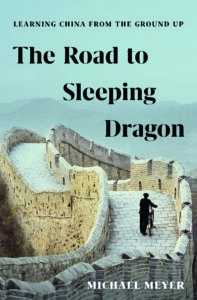Michael Meyer’s New Book Reviewed Sunday in NYTIMES (China)
This is an edited version of a long review appearing this Sunday, February 4, 2018 in The New York Times Book Section. JCoyne

China From the Ground Up
By HANNAH BEECH Southeast Asia bureau chief of The Times. –
THE ROAD TO SLEEPING DRAGON
Leaming China From the Ground Up
By Michael Meyer (China 1995-97)
296 pp. Bloomsbury. $28.
Michael Meyer, a Minnesotan who went to China as one of the Peace Corps’ first volunteers there; and Xiaolu Guo, a writer and filmmaker who grew up in a salt-spattered Chinese fishing village, explore the meaning of home in a nation perpetually in transition. The China they describe in their memoirs no longer exists, covered by layers of concrete, glass and fiber-optic cables that have tethered even the most isolated farmer to the modern age. Still, it is the journey through heady, whiplash times that helps us understand where the nation is going. If the 21st century is to be China’s era, it’s important to know how it will get there.
Meyer arrived in China and later covered the country as a reporter. His descriptions of the 1990s and early 2000s awakened my memories: the ambitious men with their pagers clipped to pleather belts; the young women click-clacking in heels and halfrolled pantyhose;”the endless questions about life in America, especially how much everything cost. (Meyer’s recollections also echo those of “River Town:’ the 2001 memoir by his fellow Peace Corps volunteer Peter Hessler, who now writes for The New Yorker.)
Meyer- ends up in Beijing, where he teaches at an international school, writes freelance stories and courts a feisty woman. from Manchuria who will become his wife. His Beijing is a city so dedicated to self-improvement that it reflects little on what is lost on the way. “Maybe;’ Meyer writes, “Beijing kept tearing itself down to bury its unexamined past.”
Meyer will go on to write a book about the destruction·of Beijing’s traditional al leyways, “The Last Days of Old Beijing;’ as well as “In Manchuria;’ which chronicles the transformation of his wife’s hometown in the rural northeast.
Today’s Beijing is sanitized and modernized. Bentleys and Serrano ham are on sale. But the city is no longer a playground for struggling artists or idealistic intellec tuals. Late last year, entire warrens inhabited by migrants were razed. And under the leadership of President Xi Jinping, the Chinese dissident movement has been coverage of China, his dispatches from Tibet and Xinjiang, vast lands on the edge of the Chinese Empire, also rely on quick anecdotes to fill out a larger truth
Still, Meyer is an amiable narrator, and he introduces the reader to some of China’s greatest paradoxes; notably a pride in history that coexists with a compulsion to destroy the past.
THE NEW YORK TIMES BOOK REVIEW
Note!
The upcoming March/April edition of The Writer’s Chronicle, published by the Association of Writers and Writing Programs, will carry a 4000-word interview I did with Michael Meyer about his new book The Road to Sleeping Dragon, his other books on China, and teaching Creative Non-Fiction at the University of Pittsburgh.
No comments yet.
Add your comment